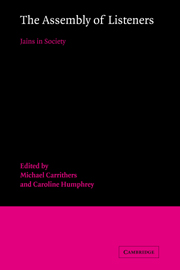Book contents
- Frontmatter
- Contents
- List of illustrations
- List of contributors
- Acknowledgements
- Map: South Asia
- Introduction
- 1 Jains as a community: a position paper
- 1 JAIN IDEALS AND JAIN IDENTITY
- 2 LOCAL JAIN COMMUNITIES
- 6 Local Jain communities
- 7 The Jain merchant castes of Rajasthan: some aspects of the management of social identity in a market town
- 8 Jain shopkeepers and moneylenders: rural informal credit networks in south Rajasthan
- 9 A study of Jains in a Rajasthan town
- 3 JAINS IN THE INDIAN WORLD
- 4 NEW JAIN INSTITUTIONS IN INDIA AND BEYOND
- Conclusion
- Glossary and pronunciation
- Select bibliography
- Index
6 - Local Jain communities
Published online by Cambridge University Press: 07 October 2011
- Frontmatter
- Contents
- List of illustrations
- List of contributors
- Acknowledgements
- Map: South Asia
- Introduction
- 1 Jains as a community: a position paper
- 1 JAIN IDEALS AND JAIN IDENTITY
- 2 LOCAL JAIN COMMUNITIES
- 6 Local Jain communities
- 7 The Jain merchant castes of Rajasthan: some aspects of the management of social identity in a market town
- 8 Jain shopkeepers and moneylenders: rural informal credit networks in south Rajasthan
- 9 A study of Jains in a Rajasthan town
- 3 JAINS IN THE INDIAN WORLD
- 4 NEW JAIN INSTITUTIONS IN INDIA AND BEYOND
- Conclusion
- Glossary and pronunciation
- Select bibliography
- Index
Summary
All three of these chapters discuss relatively small local groups of Jains in Rajasthan, but they come to different conclusions as to whether these groups are ‘communities’ in terms of the criteria in the position paper (chapter I). Howard Jones says that his circle of Jain business-men does make a community, while Christine Cottam Ellis and N. K. Singhi, both discussing much larger groups, maintain that Jains in the final analysis have a dominant identity which derives from outside the purely Jain sphere.
The issue here is the differing contexts of these three studies. Although all are in rural Rajasthan, the three groups do seem to be rather different, even allowing for the individual emphases of our authors. It is not, perhaps, so important for us to state our opinion on the issue of whether these are, or are not, communities. Readers can make their own judgement. But what is interesting is to compare the materials we are given, look at the elements of cohesion and divisiveness among the three groups of Jains, and discuss whether these correlate with the local contexts.
To begin with, the papers deal with Jain groups of very different scale. Jones has a small group of 150 Jains, all of them engaged in business and finance, living in an isolated village with a total population of around 1,000.
- Type
- Chapter
- Information
- The Assembly of ListenersJains in Society, pp. 69 - 74Publisher: Cambridge University PressPrint publication year: 1991



